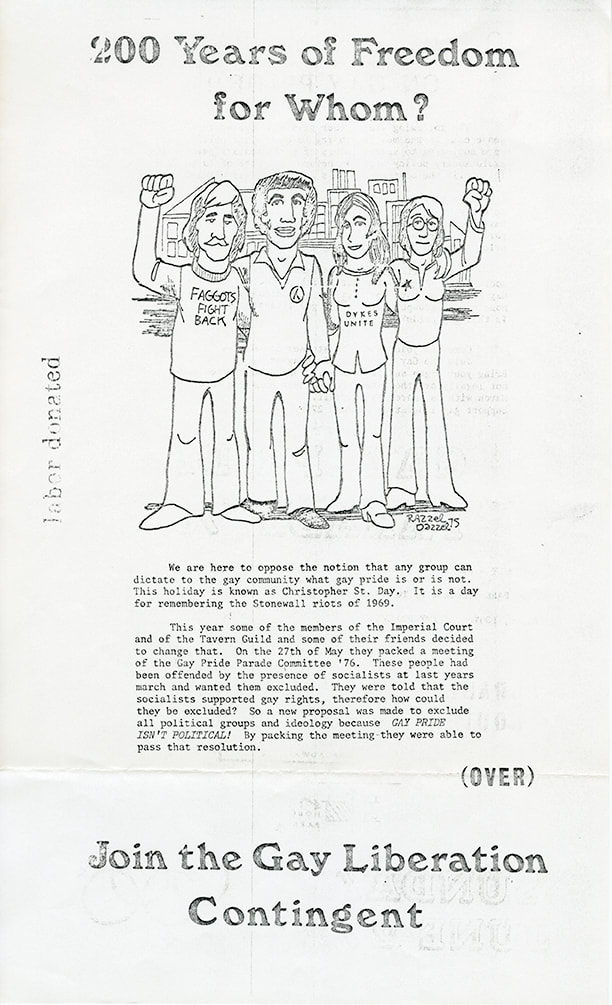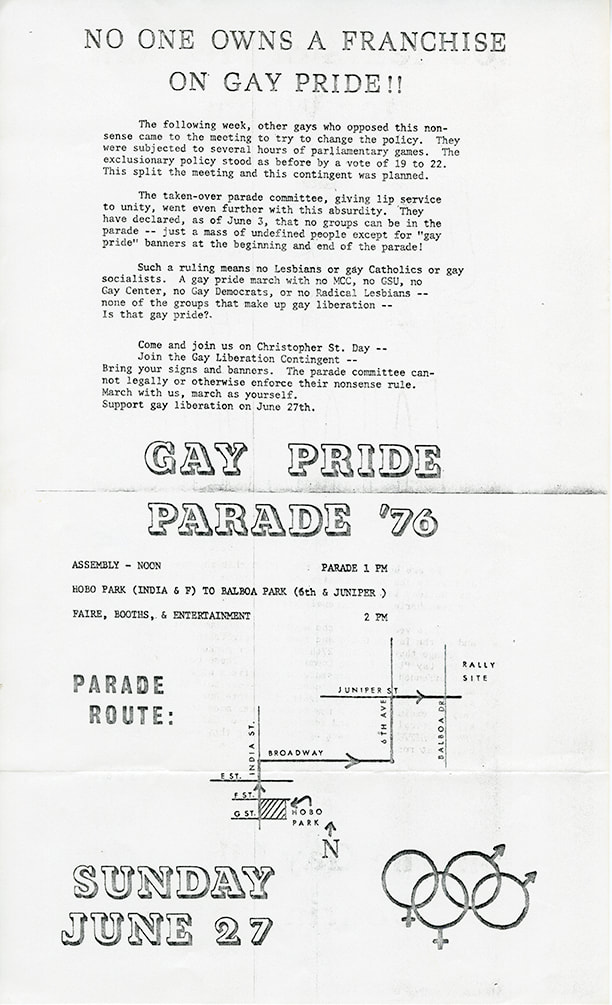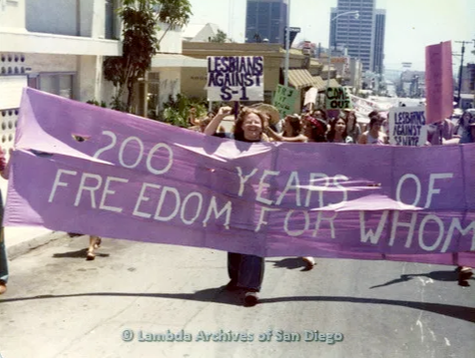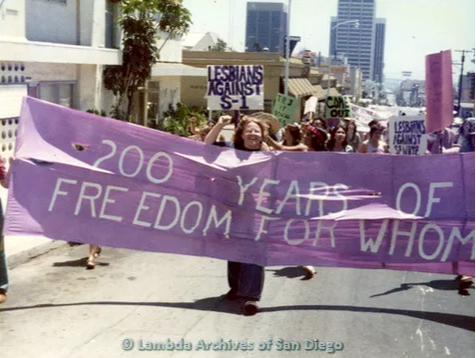|
Red Scare and the Depoliticization of San Diego Gay Pride 1976 by Gabrielle Garcia While scanning objects from an unnamed flat file drawer of miscellaneous materials from San Diego Pride events, Diversionary Theatre, and a private artist, I came across a small double-sided flyer from 1976 that immediately caught my eye. The words “200 Years of Freedom for Whom?” across the top of the first page are bold and unrelenting. As of 1976, the United States celebrated its 200th anniversary of existence, a country built and maintained by the systemic exploitation and disenfranchisement of Black, Indigenous, and other people of color, women, LGBTQ folks, disabled people, immigrants, and poor and working class people. 1976 was also the year of the second permitted San Diego Pride Parade, entitled “Gay Spirit”, six years after the events at the Stonewall Inn in New York.1 LGBTQ pride marches and events across the United States were born out of the Stonewall Uprising, led by Black and brown queer and trans folks in response to homophobic, transphobic, racist, and classist police violence in 1969. It is necessary to say that LGBTQ pride owes its very existence to the most marginalized community members who frequented the Stonewall Inn, including butch lesbians, trans folks, houseless folks, sex workers, drag queens, people of color, and those at the overlaps of these identities. Upon a closer look, this flyer reveals that in the lead up to the 1976 Gay Pride Parade, the San Diego pride committee made decisions to prohibit any “political” signage to be used in the march, shortly thereafter prohibiting any signage pertaining to a group or organization. Such decisions were reached due to pressure by the Imperial Court de San Diego and the San Diego Tavern Guild to shut out the Socialist Workers’ Party (SWP), who were accused of being too “dominating” at the 1975 pride with their signage. These decisions were intended to force SWP members as well as people of other groups, political or not, to be “just a mass of undefined people except for ‘gay pride’ at the beginning and end of the parade,” a flattening of difference and the multi-facetedness of the community for a false unity. “The Center, MCC-San Diego, MCC-Oceanside, Military Off-Limits Defense Fund, The Imperial Court of San Diego, Dignity of San Diego, and the San Diego Tavern Guild all withdrew [their participation] at the time” leading up to the march,2 in response to this flyer that was being circulated by SWP to bring attention to the hypocrisy and injustice of such behavior. Jeri Dilno, one of the pride organizers at the time—even with her own reservations about SWP’s “dominant” presence—had said that SWP “was one of the only political groups that identified LGBTQ rights as a part of their platform”.3 Such censoring, blatant targeting against SWP (despite their pro-LGBTQ platform), and coordinated attempts to depoliticize pride and LGBTQ identity are contrary to pride’s very origins and insulting to the lived realities of its most disenfranchised community members. This behavior also embodies the same conservative Cold War anti-communism that actively targeted LGBTQ folks, quashed labor unions and struggles, and destroyed millions of lives abroad through war, occupation, coups, assassinations, and sanctions. Marsha P. Johnson and Sylvia Riveria, two foremothers of the Stonewall Uprising, did not commit to their activism with Street Transvestite Action Revolutionaries (STAR)—a radical political collective that conducted political protest and demonstrations, held meetings, and provided housing and support to homeless LGBT youth and sex workers—to have their legacies depoliticized. The patrons of the Stonewall Inn and community members did not fight back against the police for their efforts to be depoliticized. The Stonewall Uprising was political. LGBTQ Pride is political. The issues, oppression, and violence that the most marginalized in our community face, including homelessness, poverty, police violence, immigration violence, and military violence worldwide, are perpetuated and maintained by capitalism, colonialism, and white supremacy. The justice, life, and freedom of LGBTQ people are entwined with the justice, life, and freedom of other folks of marginalized backgrounds who are also LGBTQ. I’m reminded of a quote that encompasses this understanding: While scanning objects from an unnamed flat file drawer of miscellaneous materials from San Diego Pride events, Diversionary Theatre, and a private artist, I came across a small double-sided flyer from 1976 that immediately caught my eye. The words “200 Years of Freedom for Whom?” across the top of the first page are bold and unrelenting. As of 1976, the United States celebrated its 200th anniversary of existence, a country built and maintained by the systemic exploitation and disenfranchisement of Black, Indigenous, and other people of color, women, LGBTQ folks, disabled people, immigrants, and poor and working class people. 1976 was also the year of the second permitted San Diego Pride Parade, entitled “Gay Spirit”, six years after the events at the Stonewall Inn in New York.1 LGBTQ pride marches and events across the United States were born out of the Stonewall Uprising, led by Black and brown queer and trans folks in response to homophobic, transphobic, racist, and classist police violence in 1969. It is necessary to say that LGBTQ pride owes its very existence to the most marginalized community members who frequented the Stonewall Inn, including butch lesbians, trans folks, houseless folks, sex workers, drag queens, people of color, and those at the overlaps of these identities. Upon a closer look, this flyer reveals that in the lead up to the 1976 Gay Pride Parade, the San Diego pride commitee made decisions to prohibit any “political” signage to be used in the march, shortly thereafter prohibiting any signage pertaining to a group or organization. Such decisions were reached due to pressure by the Imperial Court de San Diego and the San Diego Tavern Guild to shut out the Socialist Workers’ Party (SWP), who were accused of being too “dominating” at the 1975 pride with their signage. These decisions were intended to force SWP members as well as people of other groups, political or not, to be “just a mass of undefined people except for ‘gay pride’ at the beginning and end of the parade,” a flattening of difference and the multi-facetedness of the community for a false unity. “The Center, MCC-San Diego, MCC-Oceanside, Military Off-Limits Defense Fund, The Imperial Court of San Diego, Dignity of San Diego, and the San Diego Tavern Guild all withdrew [their participation] at the time” leading up to the march,2 in response to this flyer that was being circulated by SWP to bring attention to the hypocrisy and injustice of such behavior. Jeri Dilno, one of the pride organizers at the time—even with her own reservations about SWP’s “dominant” presence—had said that SWP “was one of the only political groups that identified LGBTQ rights as a part of their platform”.3 Such censoring, blatant targeting against SWP (despite their pro-LGBTQ platform), and coordinated attempts to depoliticize pride and LGBTQ identity are contrary to pride’s very origins and insulting to the lived realities of its most disenfranchised community members. This behavior also embodies the same conservative Cold War anti-communism that actively targeted LGBTQ folks, quashed labor unions and struggles, and destroyed millions of lives abroad through war, occupation, coups, assassinations, and sanctions. Marsha P. Johnson and Sylvia Riveria, two foremothers of the Stonewall Uprising, did not commit to their activism with Street Transvestite Action Revolutionaries (STAR)—a radical political collective that conducted political protest and demonstrations, held meetings, and provided housing and support to homeless LGBT youth and sex workers—to have their legacies depoliticized. The patrons of the Stonewall Inn and community members did not fight back against the police for their efforts to be depoliticized. The Stonewall Uprising was political. LGBTQ Pride is political. The issues, oppression, and violence that the most marginalized in our community face, including homelessness, poverty, police violence, immigration violence, and military violence worldwide, are perpetuated and maintained by capitalism, colonialism, and white supremacy. The justice, life, and freedom of LGBTQ people are entwined with the justice, life, and freedom of other folks of marginalized backgrounds who are also LGBTQ. I’m reminded of a quote that encompasses this understanding: “There is no thing as a single-issue struggle because we do not live single-issue lives.” — Audre Lorde LGBTQ Pride must be as multi-faceted in its protest, organizing, and celebration as its community members are. We as a community cannot be free until the most marginalized of us are free. We cannot allow such harmful divisiveness to repeat AND we must examine the ways in which privileged LGBTQ folks can actively harm other LGBTQ community members of other oppressed backgrounds. We must examine the roles that law enforcement, the military, and the Republican and Democractic parties have played historically and actively continue to play in exploiting and harming LGBTQ folks, especially BIPOC, disabled, immigrant, poor and working class, and houseless folks. Addressing the uncomfortable subject of assimilation into violent institutions, such as with the recent repeal of the military trans ban or the inclusion of LGBTQ people in American police forces, are vital to challenging the goals and direction of the broader LGBTQ community. What does it mean to gain access to inherently violent occupations and institutions that actively oppresses and disenfranchises marginalized people domestically and abroad as a member of a marginalized community? What lines do we draw? What compromises do we make? Which hypocrisies and contradictions are tolerable and which aren’t? There are no clear cut answers to these questions, but they must be reckoned with if we as a community continue to espouse goals of equity and justice. 1“1976 ‘Gay Spirit,’” San Diego Pride Timeline, Out on the Left Coast, last modified October 11, 2017, https://sdpride.sdsu.edu/gay-spirit/#.
2“1976,” San Diego Pride, last modified June 5, 2020, https://sdpride.org/year1976/. 3San Diego Pride, “Jeri Dilno, ‘1976,’” Youtube video, 02:14, posted April 3, 2016, https://www.youtube.com/watch?v=-yqStB5wNgM. 4“1976 ‘Gay Spirit,’” San Diego Pride Timeline, Out on the Left Coast, last modified October 11, 2017, https://sdpride.sdsu.edu/gay-spirit/#. Gabrielle Garcia (they/he/she) is a Project Assistant at Lambda Archives. He is a white Cuban Jewish non-binary butch lesbian with class and educational privilege and abolitionist left politics. Additionally, they are an artist and designer, aspiring archivist, and a 2019 graduate from Scripps College with a BA in Media Studies and two minors in Art and Feminist, Gender, & Sexuality Studies. She is interested in the intersections of art, media, film, publishing, archives, and the LGBTQ community (especially butch lesbians). They will be applying to library and information science masters programs this winter.
0 Comments
Leave a Reply. |
Archives
November 2022
Categories
All
|
SIGN UP FOR OUR NEWSLETTER!Get Monthly updates on all the happenings at Lambda Archives
|
© Lambda Archives of San Diego. All rights reserved.





 RSS Feed
RSS Feed